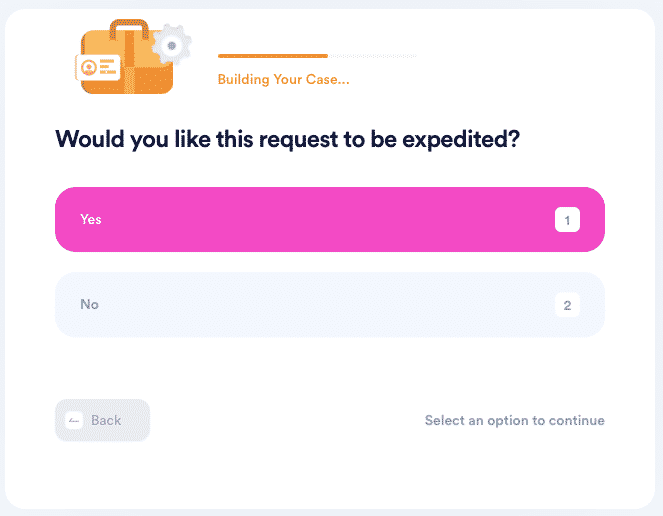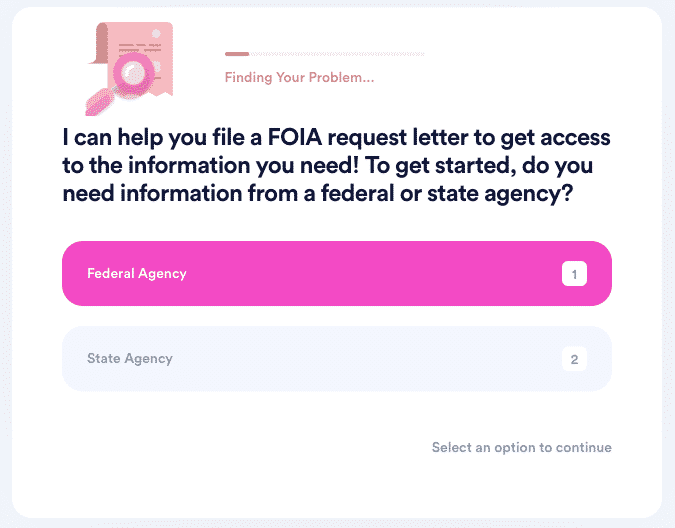The Summary of the DHS FOIA
Thanks to The Freedom of Information Act of 1966, the general public can have insight into the workings of many federal agencies, including the CIA, FBI, IRS, and the State Department. The United States Department of Homeland Security (DHS) is no exception.
By filing a DHS FOIA request, you will be able to access any of the agency’s records, except for those protected by the specified exemptions and exclusions. DoNotPay can help you take full advantage of that fact and file a DHS FOIA request letter without any trouble!
What Are the Department of Homeland Security FOIA Regulations?
DHS is a federal department that receives almost 40% of total requests made to the Federal Government. If you want to access DHS records, you should know which documents are not available to the public.
DHS will deny your request for any information that can potentially jeopardize public safety, national security, individual privacy, or law enforcement practices. The FOIA defines such documents as exemptions. There are nine exemptions to FOIA, and they include:
- Classified foreign relations and national defense information
- DHS internal rules and practices
- Information that other laws prohibit from disclosing
- Confidential trade secrets and commercial or financial information
- Inter- and intra-agency communication and decisions
- Information that would, if released, jeopardize an individual’s personal privacy
- records whose disclosure can interfere with law enforcement proceedings
- Information related to the supervision of financial institutions
- Geological or geophysical information about wells
The FOIA classifies certain documents as exclusions due to special circumstances. Three categories of documents that are not available to the general public include:
- Information about the law proceedings that involve the violation of criminal law
- Identification of a confidential informant in criminal proceedings
- Records in the ownership of the FBI related to foreign intelligence and counterintelligence or international terrorism
The Cost of Submitting a DHS FOIA Request
DHS charges a certain amount for searching, reviewing, or duplicating the documents you want.
Here is an overview of services and fees:
| Service | Fee |
|
Searching | Clerical search—$4/15 min
Professional search—$7/15 min Managerial search—$10.25/15 min |
|
Reviewing | Clerical review—$4/15 min
Professional review—$7/15 min Managerial review—$10.25/15 min |
|
Duplicating | 10 cents per page |
Fees are established by the DHS rules and involve three categories of requesters. DHS charges differently for each category. The rules are as follows:
- Commercial requesters are charged for searching, reviewing, and duplicating the document
- News media, educational, and scientific requesters have to pay for the duplication of over 100 pages
- Other requesters need to pay for the search of over two hours and the duplication of more than 100 pages
DHS will not charge you if the total expenses are under $14. When you submit your request, you will be obligated to pay up to $25 for the aforementioned services. If the charges exceed that amount, DHS will notify you.
You can request a fee waiver if you can prove that releasing the information from the document is in the public's interest.
What Should My DHS FOIA Request Form Include?
Filing a FOIA request is not an easy task. Before drafting a letter, you have to perform a few steps to ensure that the document you seek will reach you. Take a look at the table below to see what those steps involve:
| Step | Details |
|
Identify the record | Determine whether you are searching for a memo, an email, a voice message, or another format |
|
Check available resources | Browse the internet to check if the record you want is already available in the public domain |
|
Determine which DHS sector has the record | Use the DHS official website to narrow down your search |
|
Provide complete information | Make sure that your request contains:
|
How To File a Department of Homeland Security FOIA Request on My Own
Provided you completed all the steps that we suggested, you can file your DHS FOIA request in several ways. Follow our guidelines and choose the method that suits you best:
- Send your request via an online form—register to create an online profile and use it to submit a FOIA request, appeal the response, communicate with the agency, or download its response
- Fax, mail, or email your request to the specific DHS department—use the official DHS website to find contact information for the department that holds the records
File a DHS FOIA Request With the Help of DoNotPay
If all the rules about the DHS FOIA requests are giving you a headache, DoNotPay provides an easier way to go. We can write and send the letter, and increase your chances of getting the records you seek!
All you have to do is:
- Open DoNotPay in your
- Look for the FOIA request feature
- Select DHS
- Indicate the type of records you are seeking
- Point out if you would like a fee waiver or expedited processing

If you want to know more about the meaning of the FOIA, you are in the right place! Discover how to check your FOIA request status and submit a FOIA request on yourself.
will explain how to submit your FOIA request online and where to find the best FOIA request letter templates. If you need to file a FOIA request letter to a local or state agency, our app makes it possible!

Forget About Bureaucracy With DoNotPay
There's no end to what our AI Consumer Champion can help you do. From asking for bill extensions and reducing property taxes to connecting with an inmate in a federal prison and contesting parking citations, DoNotPay can handle it all and cut through the red tape.
Need to pass a government test? Use our practice tests database to nail it. Looking to file an insurance claim? You've come to the right place. College applications drained your accounts? Request college fee waivers with our assistance.
The DoNotPay app is so versatile that it can easily locate any unclaimed funds under your name or any clinical trials that you're eligible to participate in. We can also schedule DMV appointments and take care of your small claims court documents.
Check Out What Else DoNotPay Has in Store
DoNotPay never stops upping the game. You can explore some of our latest features and see how you can access public records, receive free online fax, submit a warranty claim, or get compensation if you were a victim of a crime.
Alternatively, check out some of our most popular products that aim to reclaim your funds—from getting airline flight compensation and submitting refund and chargeback claims to canceling your unused subscriptions and getting class action cash from email, text, and robocall scammers.


